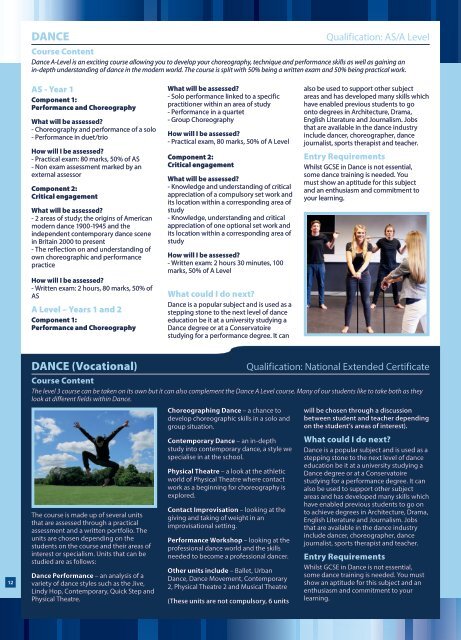6th
2016-17 Sixth Form Prospectus
2016-17 Sixth Form Prospectus
Create successful ePaper yourself
Turn your PDF publications into a flip-book with our unique Google optimized e-Paper software.
DANCE<br />
Qualification: AS/A Level<br />
Course Content<br />
Dance A-Level is an exciting course allowing you to develop your choreography, technique and performance skills as well as gaining an<br />
in-depth understanding of dance in the modern world. The course is split with 50% being a written exam and 50% being practical work.<br />
AS - Year 1<br />
Component 1:<br />
Performance and Choreography<br />
What will be assessed?<br />
- Choreography and performance of a solo<br />
- Performance in duet/trio<br />
How will I be assessed?<br />
- Practical exam: 80 marks, 50% of AS<br />
- Non exam assessment marked by an<br />
external assessor<br />
Component 2:<br />
Critical engagement<br />
What will be assessed?<br />
- 2 areas of study; the origins of American<br />
modern dance 1900-1945 and the<br />
independent contemporary dance scene<br />
in Britain 2000 to present<br />
- The reflection on and understanding of<br />
own choreographic and performance<br />
practice<br />
How will I be assessed?<br />
- Written exam: 2 hours, 80 marks, 50% of<br />
AS<br />
A Level – Years 1 and 2<br />
Component 1:<br />
Performance and Choreography<br />
What will be assessed?<br />
- Solo performance linked to a specific<br />
practitioner within an area of study<br />
- Performance in a quartet<br />
- Group Choreography<br />
How will I be assessed?<br />
- Practical exam, 80 marks, 50% of A Level<br />
Component 2:<br />
Critical engagement<br />
What will be assessed?<br />
- Knowledge and understanding of critical<br />
appreciation of a compulsory set work and<br />
its location within a corresponding area of<br />
study<br />
- Knowledge, understanding and critical<br />
appreciation of one optional set work and<br />
its location within a corresponding area of<br />
study<br />
How will I be assessed?<br />
- Written exam: 2 hours 30 minutes, 100<br />
marks, 50% of A Level<br />
What could I do next?<br />
Dance is a popular subject and is used as a<br />
stepping stone to the next level of dance<br />
education be it at a university studying a<br />
Dance degree or at a Conservatoire<br />
studying for a performance degree. It can<br />
also be used to support other subject<br />
areas and has developed many skills which<br />
have enabled previous students to go<br />
onto degrees in Architecture, Drama,<br />
English Literature and Journalism. Jobs<br />
that are available in the dance industry<br />
include dancer, choreographer, dance<br />
journalist, sports therapist and teacher.<br />
Entry Requirements<br />
Whilst GCSE in Dance is not essential,<br />
some dance training is needed. You<br />
must show an aptitude for this subject<br />
and an enthusiasm and commitment to<br />
your learning.<br />
12<br />
DANCE (Vocational)<br />
Qualification: National Extended Certificate<br />
Course Content<br />
The level 3 course can be taken on its own but it can also complement the Dance A Level course. Many of our students like to take both as they<br />
look at different fields within Dance.<br />
The course is made up of several units<br />
that are assessed through a practical<br />
assessment and a written portfolio. The<br />
units are chosen depending on the<br />
students on the course and their areas of<br />
interest or specialism. Units that can be<br />
studied are as follows:<br />
Dance Performance – an analysis of a<br />
variety of dance styles such as the Jive,<br />
Lindy Hop, Contemporary, Quick Step and<br />
Physical Theatre.<br />
Choreographing Dance – a chance to<br />
develop choreographic skills in a solo and<br />
group situation.<br />
Contemporary Dance – an in-depth<br />
study into contemporary dance, a style we<br />
specialise in at the school.<br />
Physical Theatre – a look at the athletic<br />
world of Physical Theatre where contact<br />
work as a beginning for choreography is<br />
explored.<br />
Contact Improvisation – looking at the<br />
giving and taking of weight in an<br />
improvisational setting.<br />
Performance Workshop – looking at the<br />
professional dance world and the skills<br />
needed to become a professional dancer.<br />
Other units include – Ballet, Urban<br />
Dance, Dance Movement, Contemporary<br />
2, Physical Theatre 2 and Musical Theatre<br />
(These units are not compulsory, 6 units<br />
will be chosen through a discussion<br />
between student and teacher depending<br />
on the student’s areas of interest).<br />
What could I do next?<br />
Dance is a popular subject and is used as a<br />
stepping stone to the next level of dance<br />
education be it at a university studying a<br />
Dance degree or at a Conservatoire<br />
studying for a performance degree. It can<br />
also be used to support other subject<br />
areas and has developed many skills which<br />
have enabled previous students to go on<br />
to achieve degrees in Architecture, Drama,<br />
English Literature and Journalism. Jobs<br />
that are available in the dance industry<br />
include dancer, choreographer, dance<br />
journalist, sports therapist and teacher.<br />
Entry Requirements<br />
Whilst GCSE in Dance is not essential,<br />
some dance training is needed. You must<br />
show an aptitude for this subject and an<br />
enthusiasm and commitment to your<br />
learning.


